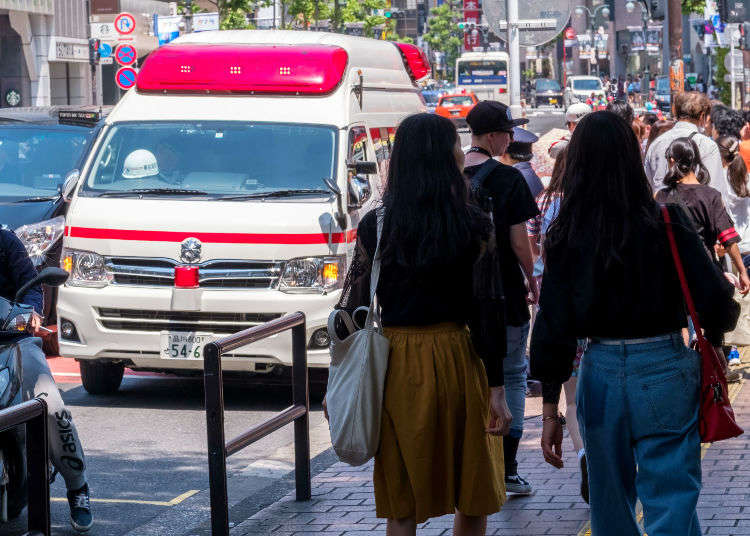
Getting injured or sick in Japan is the last thing you need while traveling. Still, sometimes it does happen and getting the help and health care you need can be quite the ordeal in a country with a different language and culture.
Still, there’s no need to panic: from smaller discomforts such as jetlag to being in an accident, here is everything you need to know when getting injured or sick in Japan.
- Table of Contents
1) What if I Get Sick in Japan? Seeing a Doctor in Japan

If you need to see a doctor or go to the hospital while in Japan, check the “Search Medical Institutions” site by the Japan Tourism Agency. On top of that, hotel desks and tourist information centers are places that will help you out as well. If you have a foreign travel health insurance, your insurance company will also point you to affiliated medical institutions.
- List of tourist-friendly medical institutions (Japan Tourism Agency)
Search for doctors and hospitals all over the country by area, language, medical department, whether credit card payment is accepted, and JMIP (“Japan Medical Service Accreditation for International Patients,” an accreditation system for medical institutions accepting international patients).
Available in: English, Chinese, Korean
<@https://www.jnto.go.jp/emergency/eng/mi_guide.html#search|a=https://www.jnto.go.jp/emergency/eng/mi_guide.html#search>
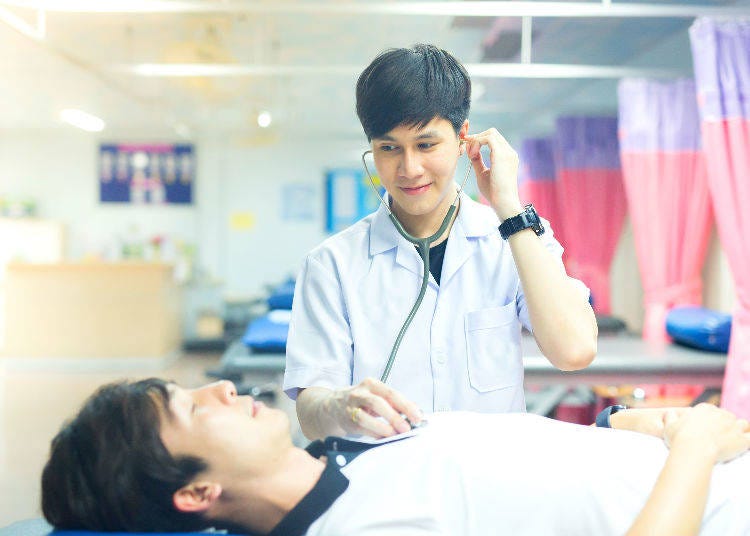
Example of multilingual medical institutions with JMIP certification in Tokyo
Center Hospital of the National Center for Global Health and Medicine
Address: 1-21-1 Toyama, Shinjuku-ku, Tōkyō-to 162-0052
Phone: 03-3202-7181
24-hour emergency visit, English language support, JMIP certification
Tokyo Nishi Tokushukai Hospital
Address: 3-1-1 Matsubara-chō, Akishima-shi, Tōkyō-to 196-0003
Phone: 042-500-4433
Emergency visit, English/Chinese/Korean language support, JMIP certification
About Japanese Hospitals
Japan has university-affiliated hospitals, public hospitals operated by the state or city, large private hospitals, and small clinics. While large hospitals boast several departments, facilities, and numerous staff members, patients with referrals get preferred treatment and walk-in patients usually have to wait quite a long time before being able to see a doctor.
In case of an emergency in Japan, please make sure to go to an emergency hospital or one that accepts walk-ins at night, or call 119 for an ambulance.
Japan emergency number
The emergency number in Japan is 119.
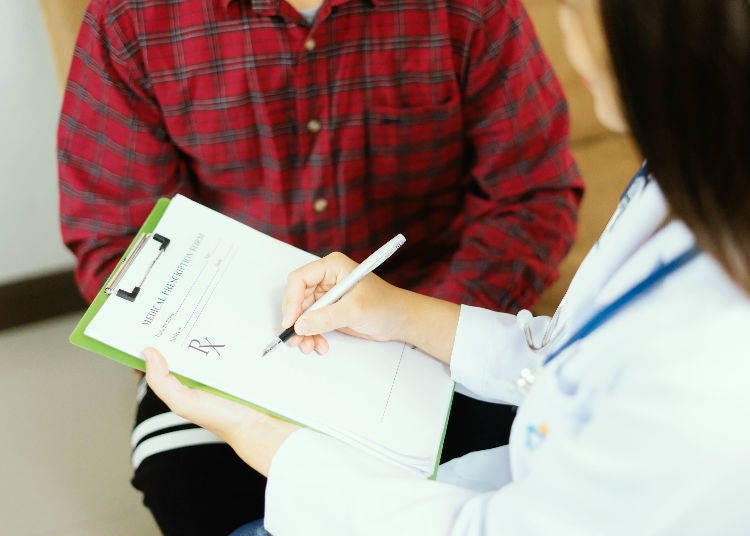
Bring notes about your own medical information
Not all hospitals have resident interpreters or staff that can speak English. If you have a medical condition or are pregnant, it is a good idea to prepare notes about your medical information in English.
Bring them with you to the hospital as they can help to make the experience a lot smoother. It also helps if you happen to be in an accident or condition that leaves you unable to explain – the staff can simply read your notes then.
Important medical information:
- Name
- Blood type
- Any illnesses currently being treated
- Any medicines you are taking
- Allergies
- Medical history
- Your religion
- Emergency contact information
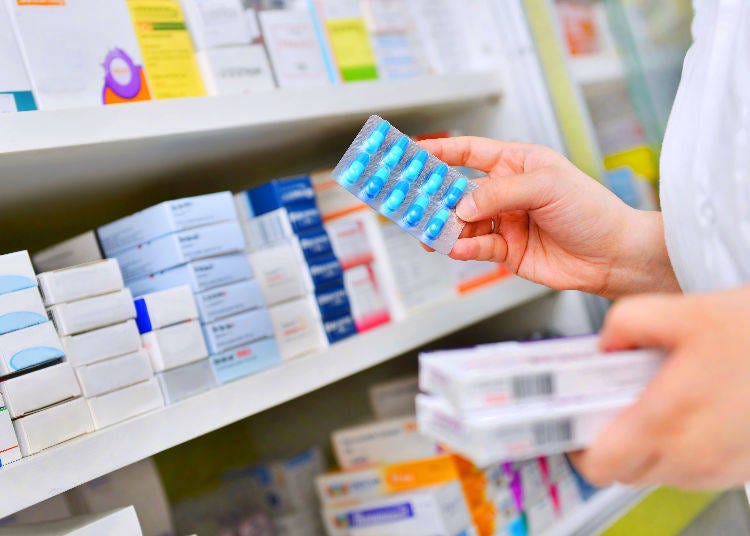
Getting prescriptions and medicine in Japan
After the doctor’s examination, you will get a prescription for the necessary medicine at the checkout counter when you settle your bill.
Small clinics often have a drug dispensary, but in most cases, you will simply be given a prescription. In that case, you have to get the medicine at a pharmacy by yourself.
Large hospitals have several pharmacies in their direct vicinity, so simply give them your prescription and you will receive the medicine.
If you cannot find a pharmacy nearby, you need to look for a “prescription pharmacy” or drugstore nearby, featuring the characters 処方箋薬局 (shohōsen yakkyoku). Look inside stores for a prescription counter and see if they can help you.
Also, if you get your medicine at a pharmacy, you will have to pay for it separately. If you don’t know where to go to get the medicine, ask the reception of the hospital. Even if they do not speak English, they can help you with a map!
2) Can I Use my Insurance in Japan? Check the What and How of Your Foreign Travel Health Insurance!
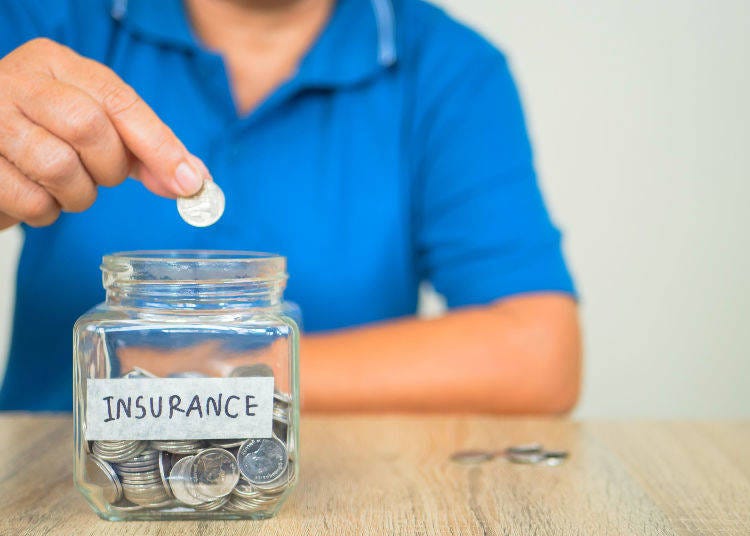
Going to a hospital and paying the full medical bill can be very expensive in Japan. Foreign travel health insurances of your own country will cover part of the medical expenses you have during a trip abroad.
Depending on your insurance, you can even get treatment at designated hospitals without the need for cash.
It depends on your insurance how much you will have to pay and whether hospitals offer this cashless service, so check your insurance details and choose a hospital accordingly.
Sometimes, you may be able to connect your credit card to your foreign travel health insurance in advance. In any case, these are details that you should confirm before, alongside having a contact in case something happens during your trip.
If you do not have foreign travel insurance from your own country, you can apply for one after coming to Japan. Having such insurance is a safe choice, should you encounter any emergency in Japan.
Tokio Marine & Nichido Fire Insurance Co., Ltd.
Available languages: English, Chinese, Korean
Insurance fee: 760 yen per day, 3,610 yen for up to 10 days (see the link below for details)
Sompo Japan Nipponkoa
Available languages: English, Chinese, Korean
Insurance fee: 2,900 yen for 10 days (depends on the number of days. See the homepage for details)
Insurance Support Call Center
9:00 a.m. – 5:00 p.m. (closed from December 31 to January 3)
English: 0120-950-786 (free)
Chinese: 0120-950-857 (free)
Korean: 0120-950-913 (free)
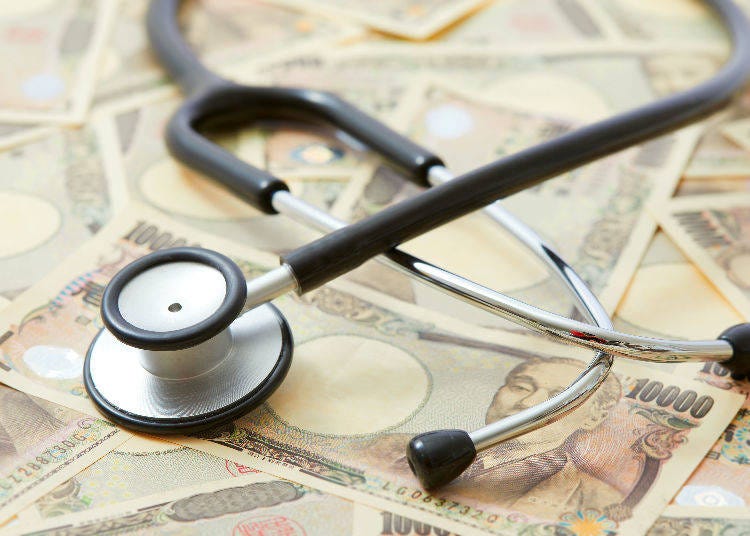
Examples of estimated medical expenses without insurance
- First medical examination: ~3,000 yen
- Blood test: ~6,000 yen
- X-ray: from 2,000 yen (varies by body part and number of images)
- Abdominal CT: ~15,000 yen
- Treatment, surgery: ~5,500 yen (cut finger), ~20,000 yen (fractured foot)
Of course, the total medical bill is a combination of all treatments and measures you received. If you need to undergo surgery as a result of a traffic accident, for example, the cost may reach hundreds of thousands of yen.
3) No Need for a Doctor: Where to Buy Over-the-counter Medicine

If you feel sick but don’t feel that seeing a doctor is necessary, such as having a cold, stomach issues, drank too much, getting a wound from falling, and so on, you can simply buy medicine at a drugstore. Let’s check what and how to buy!
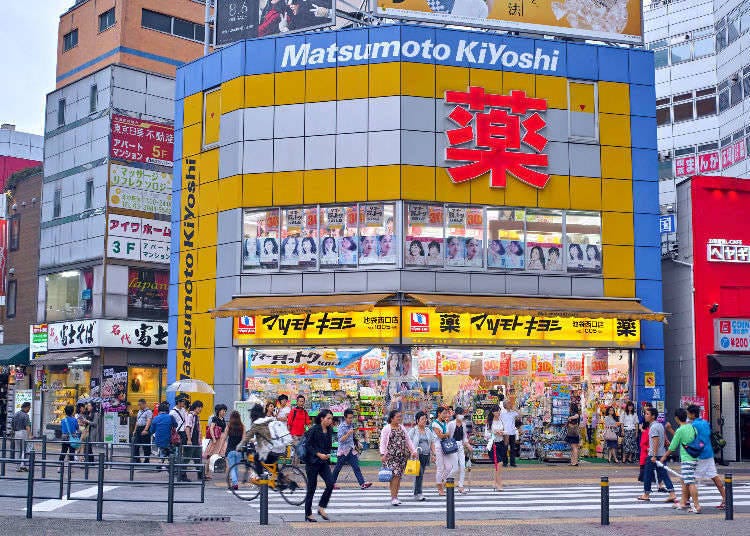
Drugstore chains in Japan
The large drugstore chain Matsumoto Kiyoshi has multilingual staff at many of its locations in Tokyo. Especially shops in Shibuya, Shinjuku, Ikebukuro, and Ginza – neighborhoods with a lot of tourists – tend to have staff able to speak English, Chinese, and Korean. Do not hesitate to talk to the staff when you need medicine for a specific issue.
Feel free to look up our guide on medicine popular among Japanese people, recommended by the store manager of Matsumoto Kiyoshi Ginza Miyuki Ave, and speak to the store’s own pharmacist!
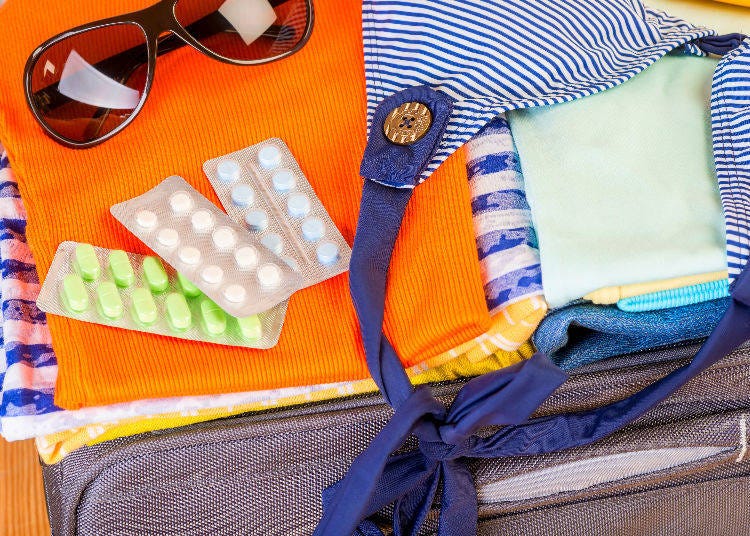
Can I buy drugs from my own country in Japan?
Approved drugs vary in type and composition from country to country. It is not uncommon that a drug, readily available in your own country, is prohibited to manufacture and sell somewhere else. If you regularly take medicine at home, it is highly recommended to bring a sufficient amount to Japan as well.
- Bringing medicine into Japan
As mentioned above, if you take a medicine regularly, you are allowed to bring it to Japan. Regular drugs for cold or stomach issues in pill or powder form can also be imported without issues.
Try to limit the amount to what you need and store it in your suitcase, except for the specific amount you plan on taking on the plane.
If you’re using a pill case or another container, it is best to bring either the original box or the patient information leaflet that clearly states the manufacturer and the base compounding, as you might be asked about the drugs.
If you have liquid medicine in a 100ml container, put it in a transparent bag and show it at the baggage inspection.
If you need special medicine or a large amount in your carry-on luggage due to a medical condition, make sure to notify and show it to the staff along with a medical certificate and prescription. With a doctor’s prescription, you are allowed to bring pills, powdered and liquid medicine to Japan.
4) Accidents and Sudden Sickness: Calling the Ambulance with 119
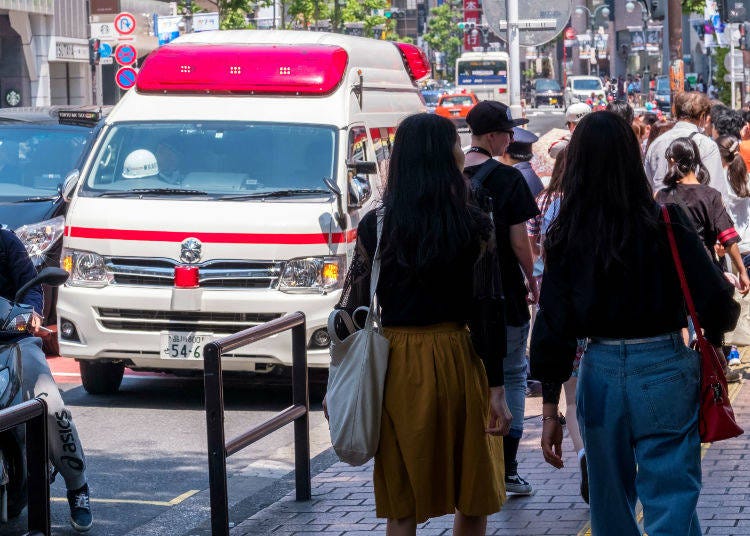
Should there be an accident or you suddenly feel sick in Japan, do go to an emergency hospital or call an ambulance. If you feel well enough to look up or ask directions to such an emergency hospital, you can get there by taxi.
If you need urgent care, do not hesitate to call an ambulance via 119. Of course, 119 is free from both mobile phones and payphones. Should you not have a mobile phone on you and cannot find a public phone, ask nearby Japanese people to call a kyūkyūsha (ambulance).
- How to call an ambulance
1) Call 119.
2) Say “medical emergency.” (English is fine.)
119 responds to both fire and medical emergencies, so it is important to say that you need first aid.
3) Tell the operator where you are.
4) Tell them “who,” “since when,” and “what kind of symptoms.”
5) Name the “patient’s name,” a “contact” (such as phone number), and the patient’s “age.”
In general, the information as just described is confirmed by phone. Answer the operator to the best of your ability, and should you not know your current whereabouts, ask nearby Japanese people for help.
- Japanese phrases for calling an ambulance
When talking to 119:
Kyū-kyū-sha o onegai shimasu. (“I need an ambulance/This is a medical emergency.”)
When asking nearby people to call an ambulance:
Kyū-kyū-sha o yonde kudasai. (“Please call an ambulance.”)
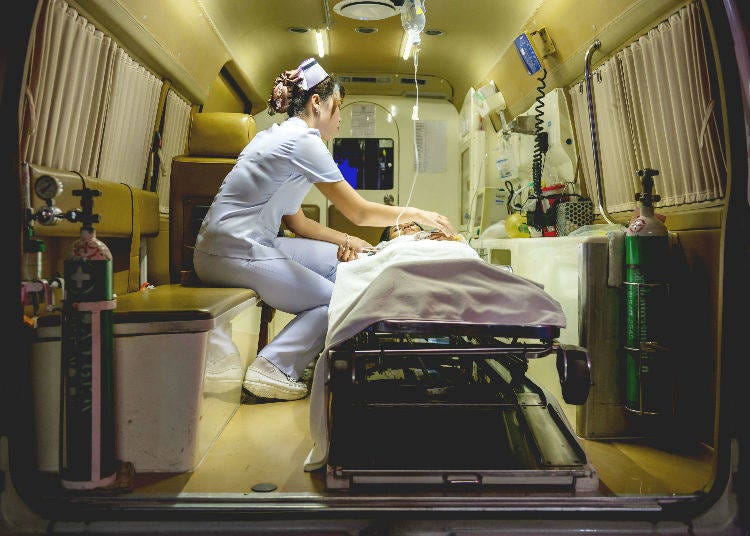
- Expenses for medical treatment in Japan
Japanese ambulances are free, regardless of your nationality. However, you are responsible for the medical bill at the destination hospital. It is safest to have a foreign travel health insurance, just in case anything unforeseen happens.
Depending on your insurance, some hospitals offer cashless settlements, so it is best to check the details of your insurance beforehand. Large hospitals tend to have credit card payment while smaller clinics may only accept cash.
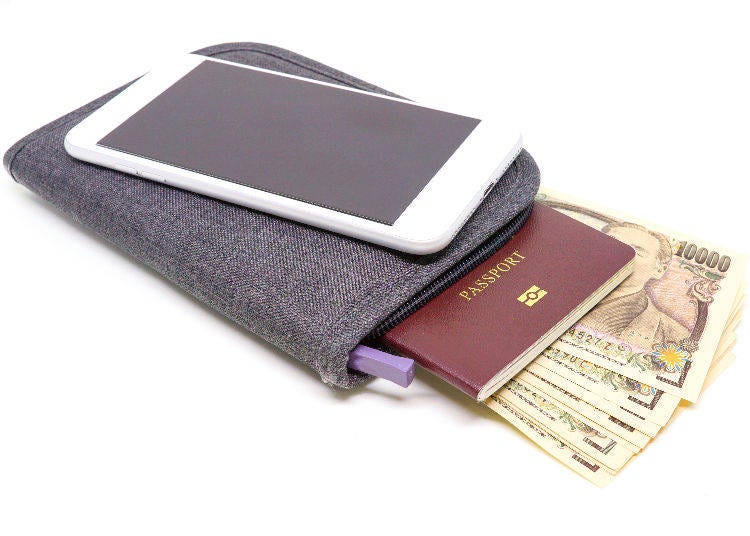
“Guide for Ambulance Services”
http://www.fdma.go.jp/html/life/gaikokujin_kyukyusya_guide/pdf/pamphiet_english.pdf
Source: Fire and Disaster Management Agency
Last but not least, there are downloadable guidebooks (in PDF format) that summarize all the points we have talked about so far. Save it on your device or print it out and put it in your luggage!
“Guidebook for when you are feeling ill”
English
https://www.jnto.go.jp/emergency/common/pdf/guide_eng.pdf
Chinese (traditional)
https://www.jnto.go.jp/emergency/common/pdf/guide_chi01.pdf
Chinese (simplified)
https://www.jnto.go.jp/emergency/common/pdf/guide_chi02.pdf
Korean
https://wwzw.jnto.go.jp/emergency/common/pdf/guide_kor.pdf
Thai
https://www.jnto.go.jp/emergency/common/pdf/guide_tai.pdf
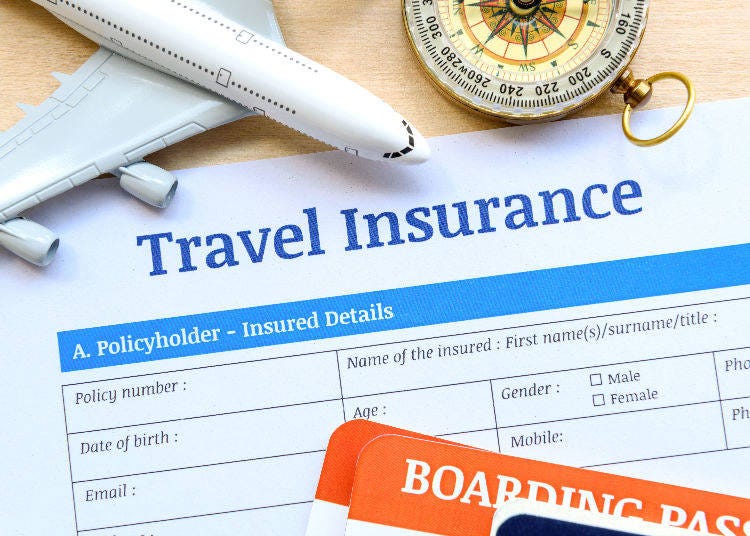
Should you experience an accident or other trouble, remember what you read about today and there’s no need to panic!
Being prepared won’t only help during an actual emergency in Japan, it also lets you travel with greater peace of mind. We wish you a wonderful and thoroughly trouble-free trip to Japan!
*Prices and options mentioned are subject to change.
*Unless stated otherwise, all prices include tax.
Popular Tours & Activitiess
Recommended places for you
-

Kanzenkoshitsuyakinikutabehodai Gyugyu Paradise Sannomiya
Yakiniku
Kobe, Sannomiya, Kitano
-

ISHIDAYA Hanare
Yakiniku
Kobe, Sannomiya, Kitano
-
Appealing

Rukku and Uohei
Izakaya
Sapporo / Chitose
-

Sunflower terminal (Osaka) Terminal 1
Other Sightseeing
USJ, Nanko Port
-

ANO-NE Kids Club
Other Sightseeing
Ginza
-
Goods

Yoshida Gennojo-Roho Kyoto Buddhist Altars
Gift Shops
Nijo Castle, Kyoto Imperial Palace
-
Ad

Japan’s Land of Yokai Monsters and Spooky Stories! A Deep Journey to Mysterious San’in (Tottori & Shimane) for Seasoned Travelers
-

Top 3 OSHI MAPs for the Best Matcha and Sweets in Tokyo
by: Guest Contributor
-

PokéPark KANTO Is Finally Open! Tokyo's New Pokémon World Starts Before You Even Arrive (2026)
by: Guest Contributor
-

A New Tokyo Landmark Is Coming in 2026, and It's Built for Modern Travelers
by: Guest Contributor
-
Ad

What Makes Japanese Yakiniku So Darn Good? Guide to Cuts, Heat, and Wagyu Know-How
-

Farewell, Heavy Suitcases! Keisei Ueno’s New Service Makes Your Last Day in Tokyo Totally Hands-Free
by: Guest Contributor
-

Chazen: the Authentic Japanese Tea Ceremony Experience in the Heart of Ginza
-

We Asked: What Do Foreign Tourists Love About Japan's Tohoku Region?
-

Easy Day Trip from Tokyo! Ultimate Sightseeing Guide for Hakone & Lake Ashinoko!
-

Secrets to Shopping in Japan: Guide to Annual Sales in Japan & Where to Shop
by: Miyu Shimada
-

T-CAT, the Tokyo City Air Terminal: Easy and Convenient Access to Narita and Haneda Airport
-

Yamagata Prefecture Guide: Destinations, Activities, Travel Advice, Shopping & More
by: Steve Csorgo
- #best sushi japan
- #what to do in odaiba
- #what to bring to japan
- #new years in tokyo
- #best ramen japan
- #what to buy in ameyoko
- #japanese nail trends
- #things to do japan
- #onsen tattoo friendly tokyo
- #daiso
- #best coffee japan
- #best japanese soft drinks
- #best yakiniku japan
- #japanese fashion culture
- #japanese convenience store snacks












